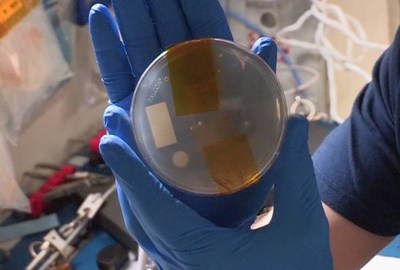First Successful CRISPR/Cas9 Gene Editing on International Space Station
– Student-led experiment edits yeast genes to study DNA repair in space
PR Newswire
CAMBRIDGE, Mass., May 23, 2019
CAMBRIDGE, Mass., May 23, 2019 /PRNewswire/ — For the first time, astronauts have used CRISPR/Cas9 technology to edit DNA in space. The gene editing technique was deployed on the International Space Station (ISS) to induce targeted breaks in the yeast genome. Molecular changes left behind as yeast repair these breaks will provide clues about how cells repair their DNA in space. This investigation was co-led by student winners of the 2018 Genes in Space national science competition co-founded by Boeing and miniPCR Bio.

The CRISPR-induced DNA lesions are intended to mimic genetic damage caused by cosmic radiation, a serious risk facing space travelers. Though cells have means of correcting DNA damage, errors in the repair process can lead to negative health consequences including cancer. Understanding how DNA repair mechanisms function in space will support the development of better safeguards for space explorers.
This Genes in Space study is the fruit of a multi-center collaboration between scientists and engineers at NASA’s Johnson Space Center, the Whitehead Institute for Biomedical Research, miniPCR Bio, and Boeing. The study was designed by David Li, Aarthi Vijayakumar, Rebecca Li, and Michelle Sung, the team of students that won the 2018 Genes in Space contest while attending Mounds View High School and Woodbury High School in Minnesota. NASA microbiologists Sarah Wallace and Sarah Stahl helped the team develop their idea and ready their experiment for spaceflight, and astronauts Christina Koch and Nick Hague executed the experiment aboard the ISS.
CRISPR/Cas9 joins a growing portfolio of molecular biology techniques available on the ISS National Lab, an expansion due in part to the multi-year collaboration between NASA’s Johnson Space Center and the Genes in Space program. This study represents the first demonstration of genetic modification of living organisms in space, a crucial milestone in the development of complete molecular biology workflows on orbit.
About Genes in Space
Genes in Space is a national STEM contest that challenges students in grades 7 through 12 to design DNA analysis experiments using the ISS National Lab. The contest is a collaboration between miniPCR Bio™ and Boeing, with generous support from CASIS (manager of the ISS National Lab), Math for America, and New England Biolabs®. www.GenesInSpace.org
Media contacts:
miniPCR Bio: Katy Martin, [email protected], +1 781-990-8727
Boeing: Carrie Arnold, [email protected], +1 281-244-4257
![]() View original content to download multimedia:http://www.prnewswire.com/news-releases/first-successful-crisprcas9-gene-editing-on-international-space-station-300856156.html
View original content to download multimedia:http://www.prnewswire.com/news-releases/first-successful-crisprcas9-gene-editing-on-international-space-station-300856156.html
SOURCE Genes in Space
